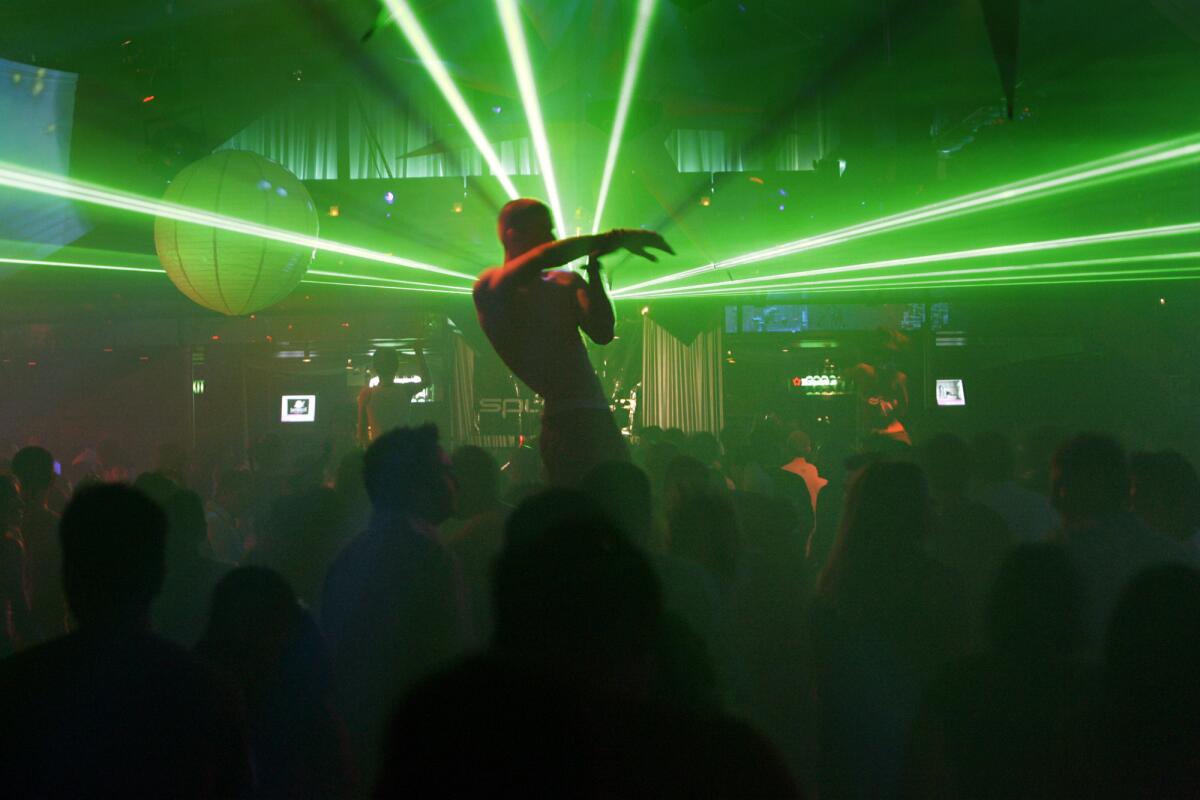Hollywood preservationists seek to protect soon-to-be-shuttered gay club

Laser lighting streaks through the crowded dance floor at Circus Disco on Aug. 5, 2006.
- Share via
Clubgoers have long strolled through the fantastical entrance of Circus Disco — the gaping mouth of a cartoonish clown — to dance the night away at the Hollywood club founded decades ago to welcome Latinos and men of color who were shunned at other gay nightspots.
When historic preservationists learned that the soon-to-be-shuttered club could be torn down for new development, they grew alarmed that another vital piece of Los Angeles’ gay history could be lost to the bulldozers.
To protect or at least commemorate Circus Disco, they proposed that the city recognize it as a historic monument, a step that could make it harder to demolish or alter the cavernous building. Such a status would not forbid demolition but could delay and complicate plans to redevelop the site with hundreds of new apartments.
Now developers seeking to remake the site on Santa Monica Boulevard near Las Palmas Avenue plan to meet with the preservationists who have pushed to enshrine Circus Disco as a monument. The goal, both sides say, is to hash out a mutually agreeable plan that recognizes the property’s history.
What that would look like, however, remains unclear. “It’s still so early that I couldn’t say,” said Richard Adkins of Hollywood Heritage, who had sought to make the building a monument.
In some other cases, landmark buildings have been demolished but commemorated with a plaque.
Brian Lewis, a spokesman for AvalonBay Communities, said the developer had agreed not to demolish the building while talks were underway. “We’re sincere in wanting to do something,” Lewis said.
L.A.’s Cultural Heritage Commission was originally scheduled to decide Thursday whether to take the 1974 club under consideration as a possible monument. Adkins and the developer asked the city commission to delay that discussion until January so the parties could negotiate.
Preservationists clamored to save Circus Disco not because of the architecture of its building — a former warehouse — but because of its history as a haven for Latino men and others who were routinely excluded from West Hollywood gay clubs that favored whites.
The novelty of Circus Disco was “allowing everyone to come in,” club founder Gene La Pietra told the Los Angeles Times nearly a quarter of a century ago. “That just was not heard of in 1975.”
Adrian Scott Fine, director of advocacy for the L.A. Conservancy, said the building helps tell the story of people who faced discrimination not only for their sexuality or gender, but also for their color or ethnicity. Even after the club shuts down, he said, the building could help bring that history to life.
The push to make Circus Disco a monument comes as other storied gay clubs have closed or are in jeopardy. Earlier this year, a club that had long been a haven for black lesbian, gay, bisexual and transgender people — Jewel’s Catch One — shut its doors. The Factory, a West Hollywood building that once housed the iconic disco Studio One, could also be demolished for new development.
When new apartments and shops were first planned at the Circus Disco site, an environmental analysis prepared for a previous owner determined that none of the affected buildings appeared to be eligible for historic protection.
Fine and other preservationists point out that a historic survey of sites important to the LGBT community, prepared for the city last year, included the 41-year-old club.
In a letter to the Cultural Heritage Commission, AvalonBay senior vice president of development Mark Janda said the company disagrees with the idea that Circus Disco is a historic monument and emphasized that hundreds of new apartments at the site could help chip away at L.A.’s housing shortage.
However, “we support the LGBT community, and I personally look forward to working with Hollywood Heritage and the coalition of LGBT organizations to develop an appropriate plan,” Janda wrote.
La Pietra, the founder and longtime owner of the club, did not respond to phone messages left at Circus Disco seeking comment. The Circus Disco website bills its upcoming New Year’s Eve party as “our last and greatest party ever.”
When asked how L.A. could memorialize Circus Disco if the business shuts down, Fine pointed to the Black Cat, a Silver Lake bar that received city recognition because of its history in the gay liberation movement. Police raids there kicked off protests for gay rights years before the Stonewall riots in New York.
The business is now an upscale gastropub serving up kale salad and cheese plates, but the building still bears its historic sign of a cartoon cat, displays old photographs and has a plaque recognizing its past.
“It’s not about freezing these places in time or saying that Circus Disco must stay there, but people can still learn from these places,” Fine said.
Follow @latimesemily for what’s happening at Los Angeles City Hall.
ALSO
How LAPD vice is cleaning up K-town’s less savory side
Hundreds gather in West Hollywood for Transgender Day of Remembrance
Inside West Hollywood’s feminist haunted house: Zombie folk singers and body-positive vampires
More to Read
Sign up for Essential California
The most important California stories and recommendations in your inbox every morning.
You may occasionally receive promotional content from the Los Angeles Times.














